人教版(2019)选择性必修第二册Unit4 Journey Across a Vast Land Using Language1(28张PPT)
文档属性
| 名称 | 人教版(2019)选择性必修第二册Unit4 Journey Across a Vast Land Using Language1(28张PPT) | 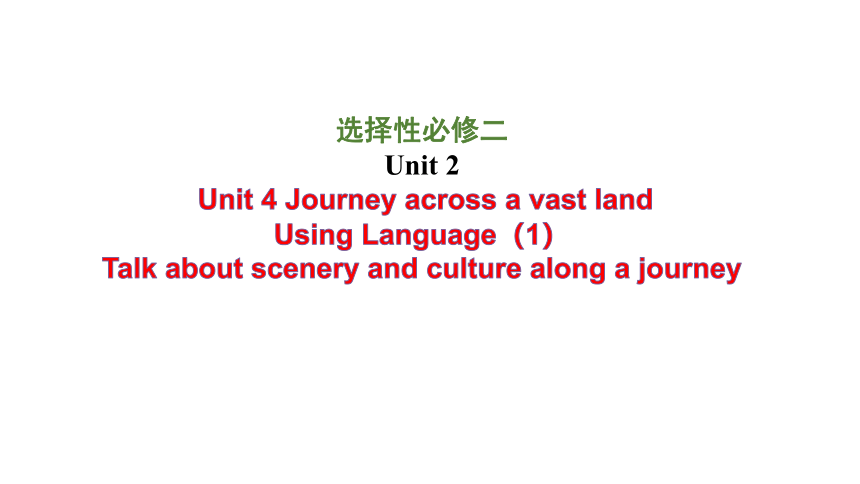 | |
| 格式 | pptx | ||
| 文件大小 | 13.9MB | ||
| 资源类型 | 教案 | ||
| 版本资源 | 人教版(2019) | ||
| 科目 | 英语 | ||
| 更新时间 | 2022-12-30 10:54:33 | ||
图片预览

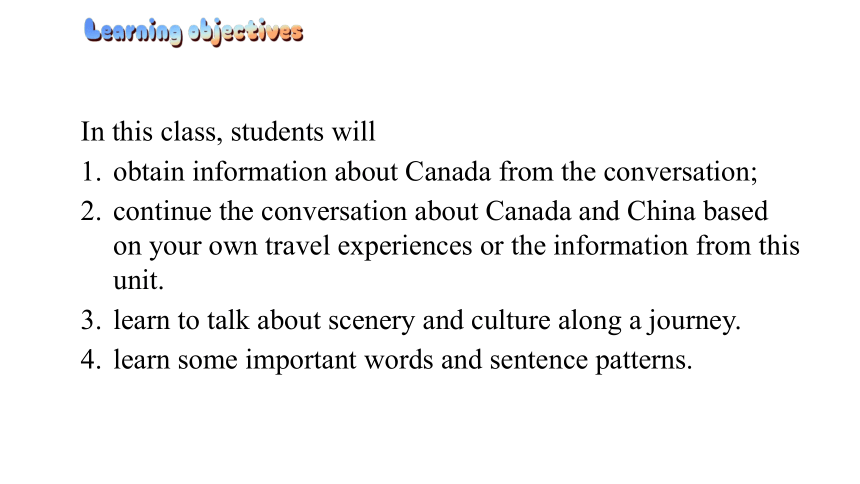
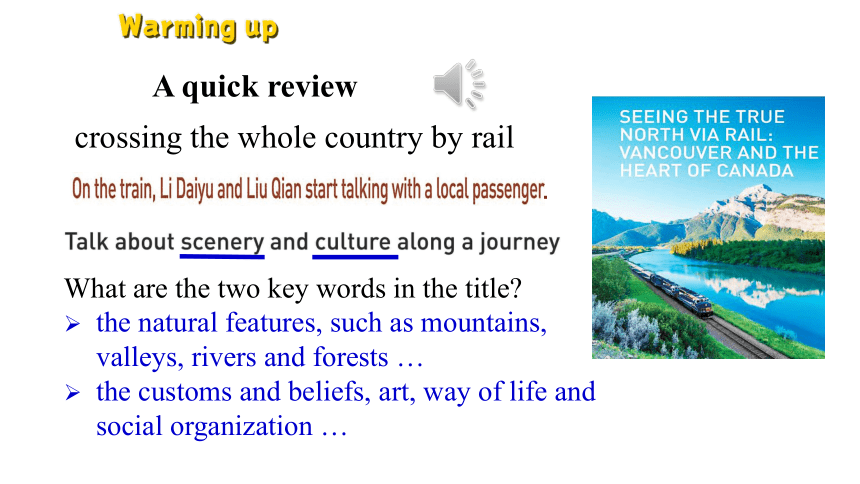
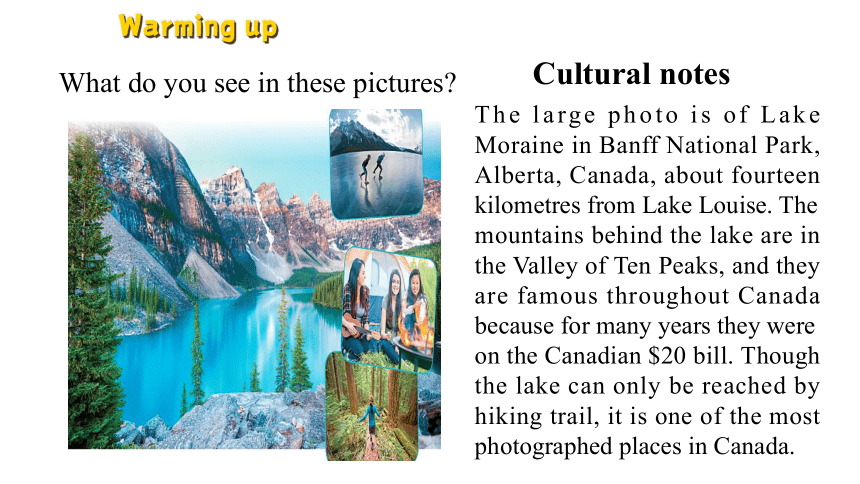
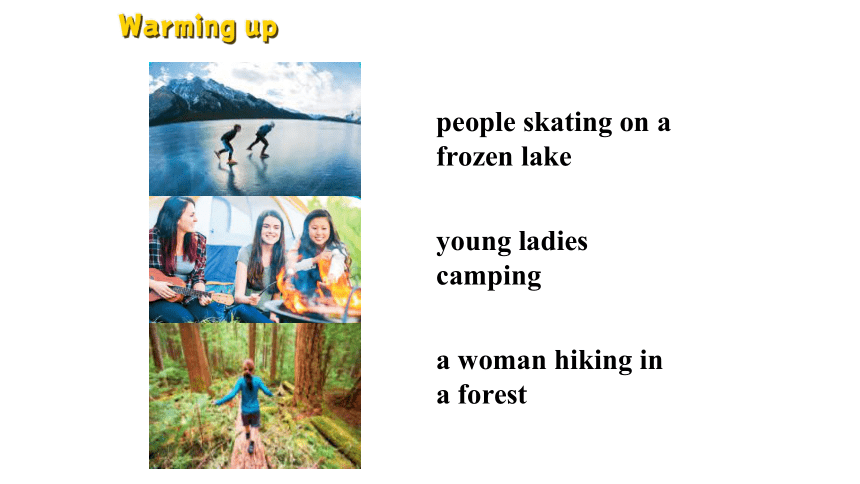
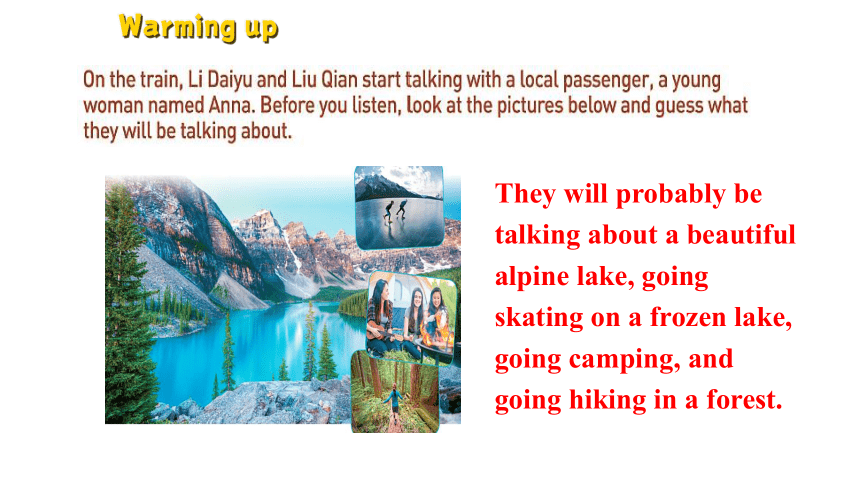
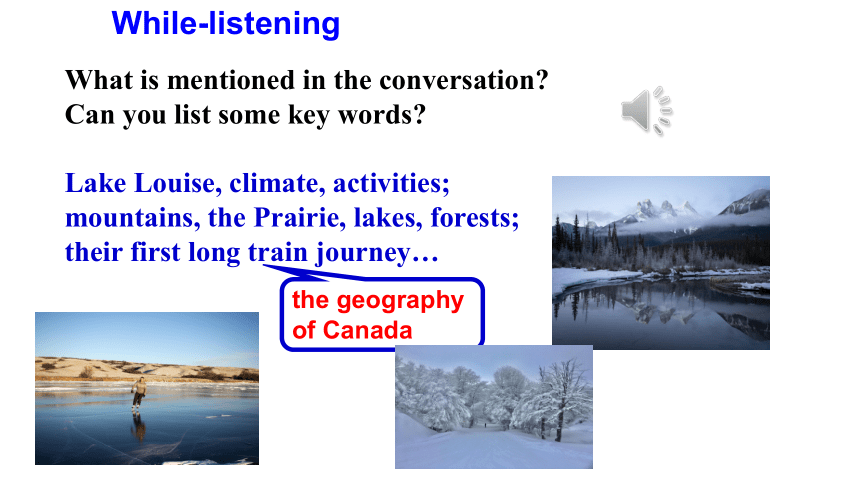
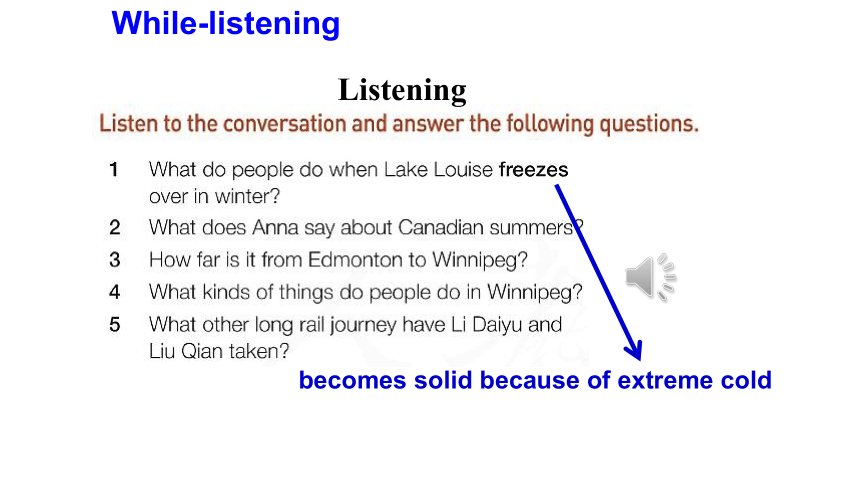
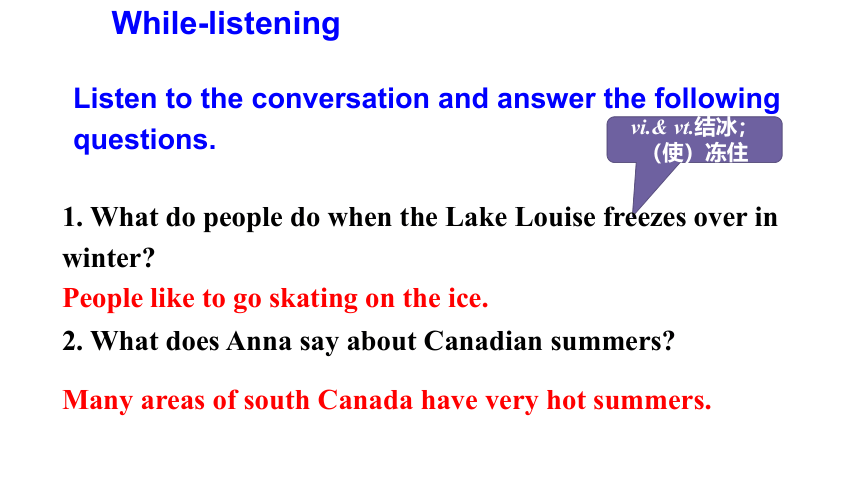
文档简介
(共28张PPT)
选择性必修二
Unit 2
Unit 4 Journey across a vast land
Using Language(1)
Talk about scenery and culture along a journey
In this class, students will
obtain information about Canada from the conversation;
continue the conversation about Canada and China based on your own travel experiences or the information from this unit.
learn to talk about scenery and culture along a journey.
learn some important words and sentence patterns.
A quick review
crossing the whole country by rail
.
What are the two key words in the title
the natural features, such as mountains, valleys, rivers and forests …
the customs and beliefs, art, way of life and social organization …
What do you see in these pictures
Cultural notes
The large photo is of Lake Moraine in Banff National Park, Alberta, Canada, about fourteen kilometres from Lake Louise. The mountains behind the lake are in the Valley of Ten Peaks, and they are famous throughout Canada because for many years they were on the Canadian $20 bill. Though the lake can only be reached by hiking trail, it is one of the most photographed places in Canada.
people skating on a frozen lake
young ladies camping
a woman hiking in a forest
They will probably be talking about a beautiful alpine lake, going skating on a frozen lake, going camping, and going hiking in a forest.
What is mentioned in the conversation
Can you list some key words
Lake Louise, climate, activities;
mountains, the Prairie, lakes, forests;
their first long train journey…
the geography of Canada
While-listening
Listening
becomes solid because of extreme cold
While-listening
vi.& vt.结冰;(使)冻住
Listen to the conversation and answer the following questions.
1. What do people do when the Lake Louise freezes over in winter
2. What does Anna say about Canadian summers
People like to go skating on the ice.
Many areas of south Canada have very hot summers.
While-listening
While-listening
3. How far is it from Edmonton to Winnipeg
4. What kinds of things do people do in Winnipeg
5. What other long rail journey have Li Daiyu
and Liu Qian taken
More than 1300kilometres.
Skiing, hiking, camping, and city things like movies or restaurants on the weekends.
They travelled from Beijing to Moscow on the Trans-Siberian Railway through Mongolia.
Listen carefully again and answer the questions.
6. What kind of climate do many areas of south Canada have
a continental climate
7. What is the mark of this kind of climate
very hot summers and very cold winters
8. After they leave Edmonton, what kind of land will they be in
the Prairie-as flat as a pancake and stretches for as far as the eye can see.
While-listening
9. After they leave Winnipeg, what kind of land will they be in
10. What kind of place is Winnipeg
There will be lakes and forests.
It’s a small city almost in the dead centre of North America, from east to west.
Listen carefully again and answer the questions.
While-listening
11. What is the name of the train line between Beijing and Moscow
12. What can you see while riding on the train in Mongolia
the Trans-Siberian Railway
We can see the grasslands with rolling hills; a few small towns; a few horses or sheep
Listen carefully again and answer the questions.
While-listening
Listening
Listening Strategy:
EXAMPLE
feel at home
feel relaxed and comfortable
cost an arm and a leg
cost a lot of money
Listening
While-listening
Match the idioms and meaning
words fail me
D. I’m surprised
Oh, my goodness! That must be Lake Louise! It’s so beautiful! Words fail me.
I’m so surprised at how beautiful it is that I can’t describe it.
While-listening
1. words fail me A. with no mountains or hills
2. as hot as an oven B. all kinds of things
3. as flat as a pancake C. for a long distance
4. as far as the eye can see D. I'm surprised.
5. dead centre E. spend time
6. kill time F. very warm
7. you name it G. the exact middle of something
Listen again. Match the following idioms and similes with their meanings.
n.习语;成语
While-listening
Speaking
What did they talk about in the conversation
Where have you travelled in China What places impressed you most
How would you continue and end the conversation
Post listening
In groups of three, continue the conversation about Canada and China based on your own travel experiences or the information you heard or read in this unit. End the conversation naturally.
Speaking
What did they talk about in the conversation
They talked about the climate and the geography of Canada, certain places in Canada and activities there. Also Li Daiyu and Liu Qian talked about their own travel experiences.
Post listening
How would you continue and end the conversation
Showing interest is an effective way to continue the conversation. And surely you should end the conversation politely.
Where have you travelled in China What places impressed you most
My favorite trip was by train to Tibet last summer. The scenery along the railway was fantastic, with green grass as far as the eye could see.
Speaking
Expressing surprise and curiosity
Post listening
Speaking
Talking about space and position
prep. 在……旁边;与……一起
adv.在旁边
Post listening
Speaking
Ending a conversation naturally
Post listening
Pay attention to what they talk about.
Anna: I thought China would be very crowded, given its large population.
Daiyu: Well, contrary to what many people believe, there are a lot of vast and empty spaces in China, actually.
Anna: That’s great! There must be amazing scenery to see in China then! ...
Speaking
different from sth
Post listening
LiuQian: There is. My favourite trip was by train to Tibet. First, we travelled south across the Kunlun Mountains.
Daiyu : Even though it was summer, they were still
covered in snow. It was so beautiful.
LiuQian: Then we entered the Tibetan Plateau.
Daiyu: The scenery there was simply fantastic.
Green grass as far as the eye could see.
And there were so many wild animals.
Post listening
LiuQian: Yes! We saw a lot of antelopes, yaks, deer… and I think I even saw a snow leopard.
Anna: Good heavens! That’s one of the rarest animals on earth.
LiuQian: But you know what was really extraordinary about our trip
Anna: No, what
LiuQian: The railway is so high that the trains have a special oxygen supply for the passengers, kind of like you would find on an airplane, so that no one will become ill.
Post listening
Learn how to end a conversation naturally.
Anna: You’re kidding! Anyhow, the next station is my stop! Take care and enjoy the rest of your trip!
Daiyu: Thanks, Anna!
Liu Qian: It was really great to meet you!
Anna: And it was nice talking to you!
Speaking
Anyhow/anyway is used when changing the subject of a conversation or ending the conversation.
Post listening
Listen again and read the conversation aloud.
Make up a dialogue about scenery and culture along a journey with your partner. using the surprise and curiosity expressions.
Practice the conversation about Canada and China based on your own travel experiences or the information you heard or read in this unit.
Thank you for attending!
Goodbye
选择性必修二
Unit 2
Unit 4 Journey across a vast land
Using Language(1)
Talk about scenery and culture along a journey
In this class, students will
obtain information about Canada from the conversation;
continue the conversation about Canada and China based on your own travel experiences or the information from this unit.
learn to talk about scenery and culture along a journey.
learn some important words and sentence patterns.
A quick review
crossing the whole country by rail
.
What are the two key words in the title
the natural features, such as mountains, valleys, rivers and forests …
the customs and beliefs, art, way of life and social organization …
What do you see in these pictures
Cultural notes
The large photo is of Lake Moraine in Banff National Park, Alberta, Canada, about fourteen kilometres from Lake Louise. The mountains behind the lake are in the Valley of Ten Peaks, and they are famous throughout Canada because for many years they were on the Canadian $20 bill. Though the lake can only be reached by hiking trail, it is one of the most photographed places in Canada.
people skating on a frozen lake
young ladies camping
a woman hiking in a forest
They will probably be talking about a beautiful alpine lake, going skating on a frozen lake, going camping, and going hiking in a forest.
What is mentioned in the conversation
Can you list some key words
Lake Louise, climate, activities;
mountains, the Prairie, lakes, forests;
their first long train journey…
the geography of Canada
While-listening
Listening
becomes solid because of extreme cold
While-listening
vi.& vt.结冰;(使)冻住
Listen to the conversation and answer the following questions.
1. What do people do when the Lake Louise freezes over in winter
2. What does Anna say about Canadian summers
People like to go skating on the ice.
Many areas of south Canada have very hot summers.
While-listening
While-listening
3. How far is it from Edmonton to Winnipeg
4. What kinds of things do people do in Winnipeg
5. What other long rail journey have Li Daiyu
and Liu Qian taken
More than 1300kilometres.
Skiing, hiking, camping, and city things like movies or restaurants on the weekends.
They travelled from Beijing to Moscow on the Trans-Siberian Railway through Mongolia.
Listen carefully again and answer the questions.
6. What kind of climate do many areas of south Canada have
a continental climate
7. What is the mark of this kind of climate
very hot summers and very cold winters
8. After they leave Edmonton, what kind of land will they be in
the Prairie-as flat as a pancake and stretches for as far as the eye can see.
While-listening
9. After they leave Winnipeg, what kind of land will they be in
10. What kind of place is Winnipeg
There will be lakes and forests.
It’s a small city almost in the dead centre of North America, from east to west.
Listen carefully again and answer the questions.
While-listening
11. What is the name of the train line between Beijing and Moscow
12. What can you see while riding on the train in Mongolia
the Trans-Siberian Railway
We can see the grasslands with rolling hills; a few small towns; a few horses or sheep
Listen carefully again and answer the questions.
While-listening
Listening
Listening Strategy:
EXAMPLE
feel at home
feel relaxed and comfortable
cost an arm and a leg
cost a lot of money
Listening
While-listening
Match the idioms and meaning
words fail me
D. I’m surprised
Oh, my goodness! That must be Lake Louise! It’s so beautiful! Words fail me.
I’m so surprised at how beautiful it is that I can’t describe it.
While-listening
1. words fail me A. with no mountains or hills
2. as hot as an oven B. all kinds of things
3. as flat as a pancake C. for a long distance
4. as far as the eye can see D. I'm surprised.
5. dead centre E. spend time
6. kill time F. very warm
7. you name it G. the exact middle of something
Listen again. Match the following idioms and similes with their meanings.
n.习语;成语
While-listening
Speaking
What did they talk about in the conversation
Where have you travelled in China What places impressed you most
How would you continue and end the conversation
Post listening
In groups of three, continue the conversation about Canada and China based on your own travel experiences or the information you heard or read in this unit. End the conversation naturally.
Speaking
What did they talk about in the conversation
They talked about the climate and the geography of Canada, certain places in Canada and activities there. Also Li Daiyu and Liu Qian talked about their own travel experiences.
Post listening
How would you continue and end the conversation
Showing interest is an effective way to continue the conversation. And surely you should end the conversation politely.
Where have you travelled in China What places impressed you most
My favorite trip was by train to Tibet last summer. The scenery along the railway was fantastic, with green grass as far as the eye could see.
Speaking
Expressing surprise and curiosity
Post listening
Speaking
Talking about space and position
prep. 在……旁边;与……一起
adv.在旁边
Post listening
Speaking
Ending a conversation naturally
Post listening
Pay attention to what they talk about.
Anna: I thought China would be very crowded, given its large population.
Daiyu: Well, contrary to what many people believe, there are a lot of vast and empty spaces in China, actually.
Anna: That’s great! There must be amazing scenery to see in China then! ...
Speaking
different from sth
Post listening
LiuQian: There is. My favourite trip was by train to Tibet. First, we travelled south across the Kunlun Mountains.
Daiyu : Even though it was summer, they were still
covered in snow. It was so beautiful.
LiuQian: Then we entered the Tibetan Plateau.
Daiyu: The scenery there was simply fantastic.
Green grass as far as the eye could see.
And there were so many wild animals.
Post listening
LiuQian: Yes! We saw a lot of antelopes, yaks, deer… and I think I even saw a snow leopard.
Anna: Good heavens! That’s one of the rarest animals on earth.
LiuQian: But you know what was really extraordinary about our trip
Anna: No, what
LiuQian: The railway is so high that the trains have a special oxygen supply for the passengers, kind of like you would find on an airplane, so that no one will become ill.
Post listening
Learn how to end a conversation naturally.
Anna: You’re kidding! Anyhow, the next station is my stop! Take care and enjoy the rest of your trip!
Daiyu: Thanks, Anna!
Liu Qian: It was really great to meet you!
Anna: And it was nice talking to you!
Speaking
Anyhow/anyway is used when changing the subject of a conversation or ending the conversation.
Post listening
Listen again and read the conversation aloud.
Make up a dialogue about scenery and culture along a journey with your partner. using the surprise and curiosity expressions.
Practice the conversation about Canada and China based on your own travel experiences or the information you heard or read in this unit.
Thank you for attending!
Goodbye
